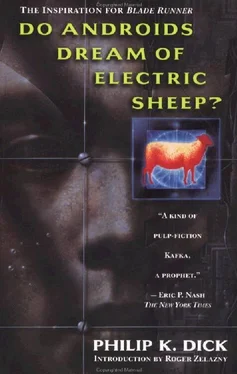“The Leningrad psychiatrists,” Bryant broke in brusquely, “think that a small class of human beings could not pass the Voigt-Kampff scale. If you tested them in line with police work you’d assess them as humanoid robots. You’d be wrong, but by then they’d be dead.” He was silent, now, waiting for Rick’s answer.
“But these individuals,” Rick said, “would all be—”
“They’d be in institutions,” Bryant agreed. “They couldn’t conceivably function in the outside world; they certainly couldn’t go undetected as advanced psychotics—unless of course their breakdown had come recently and suddenly and no one had gotten around to noticing. But this could happen .”
“A million to one odds,” Rick said. But he saw the point.
“What worried Dave,” Bryant continued, “is this appearance of the new Nexus-6 advance type. The Rosen organization assured us, as you know, that a Nexus-6 could be delineated by standard profile tests. We took their word for it. Now we’re forced, as we knew we would be, to determine it on our own. That’s what you’ll be doing in Seattle. You understand, don’t you that this could go wrong either way. If you can’t pick out all the humanoid robots, then we have no reliable analytical tool and we’ll never find the ones who’re already escaping. If your scale factors out a human subject, identifies him as android—” Bryant beamed at him icily. “It would be awkward, although no one, absolutely not the Rosen people, will make the news public. Actually we’ll be able to sit on it indefinitely, although of course we’ll have to inform W.P.O. and they in turn will notify Leningrad. Eventually it’ll pop out of the ‘papes at us. But by then we may have developed a better scale.” He picked the phone up. “You want to get started? Use a department car and fuel yourself at our pumps.”
Standing, Rick said, “Can I take Dave Holden’s notes with me? I want to read them along the way.”
Bryant said, “Let’s wait until you’ve tried out your scale in Seattle.” His tone was interestingly merciless, and Rick Deckard noted it.
When he landed the police department hovercar on the roof of the Rosen Association Building in Seattle he found a young woman waiting for him. Black-haired and slender, wearing the new huge dust-filtering glasses, she approached his car, her hands deep in the pockets of her brightly striped long coat. She had, on her sharply defined small face, an expression of sullen distaste.
“What’s the matter?” Rick said as he stepped from the parked car.
The girl said, obliquely, “Oh, I don’t know. Something about the way we got talked to on the phone. It doesn’t matter.” Abruptly she held out her hand; he reflexively took it. “I’m Rachael Rosen. I guess you’re Mr. Deckard.”
“This is not my idea,” he said.
“Yes, Inspector Bryant told us that. But you’re officially the San Francisco Police Department, and it doesn’t believe our unit is to the public benefit.” She eyed him from beneath long black lashes, probably artificial.
Rick said, “A humanoid robot is like any other machine; it can fluctuate between being a benefit and a hazard very rapidly. As a benefit it’s not our problem.”
“But as a hazard,” Rachael Rosen said, “then you come in. Is it true, Mr. Deckard, that you’re a bounty hunter?”
He shrugged, with reluctance, nodded.
“You have no difficulty viewing an android as inert,” the girl said. “So you can ‘retire’ it, as they say.”
“Do you have the group selected out for me?” he said. “I’d like to—” He broke off. Because, all at once, he had seen their animals.
A powerful corporation, he realized, would of course be able to afford this. In the back of his mind, evidently, he had anticipated such a collection; it was not surprise that he felt but more a sort of yearning. He quietly walked away from the girl, toward the closest pen. Already he could smell them, the several scents of the creatures standing or sitting, or, in the case of what appeared to be a raccoon, asleep.
Never in his life had he personally seen a raccoon. He knew the animal only from 3-D films shown on television. For some reason the dust had struck that species almost as hard as it had the birds—of which almost none survived, now. In an automatic response he brought out his much—thumbed Sidney’s and looked up raccoon with all the sublistings. The list prices, naturally, appeared in italics; like Percheron horses, none existed on the market for sale at any figure. Sidney’s catalogue simply listed the price at which the last transaction involving a raccoon had taken place. It was astronomical.
“His name is Bill,” the girl said from behind him. “Bill the raccoon. We acquired him just last year from a subsidiary corporation.” She pointed past him and he then perceived the armed company guards, standing with their machine guns, the rapid-fire little light Skoda issue; the eyes of the guards had been fastened on him since his car landed. And, he thought, my car is clearly marked as a police vehicle.
“A major manufacturer of androids,” he said thoughtfully, “invests its surplus capital on living animals.”
“Look at the owl,” Rachael Rosen said. “Here, I’ll wake it up for you.” She started toward a small, distant cage, in the center of which jutted up a branching dead tree.
There are no owls, he started to say. Or so we’ve been told. Sidney’s, he thought; they list it in their catalogue as extinct: the tiny, precise type, the E , again and again throughout the catalogue. As the girl walked ahead of him he checked to see, and he was right. Sidney’s never makes a mistake, he said to himself. We know that, too. What else can we depend on?
“It’s artificial,” he said, with sudden realization; his disappointment welled up keen and intense.
“No.” She smiled and he saw that she had small even teeth, as white as her eyes and hair were black.
“But Sidney’s listing,” he said, trying to show her the catalogue. To prove it to her.
The girl said, “We don’t buy from Sidney’s or from any animal dealer. All our purchases are from private parties and the prices we pay aren’t reported.” She added, “Also we have our own naturalists; they’re now working up in Canada. There’s still a good deal of forest left, comparatively speaking, anyhow. Enough for small animals and once in a while a bird.”
For a long time he stood gazing at the owl, who dozed on its perch. A thousand thoughts came into his mind, thoughts about the war, about the days when owls had fallen from the sky; he remembered how in his childhood it had been discovered that species upon species had become extinct and how the ‘papes had reported it each day—foxes one morning, badgers the next, until people had stopped reading the perpetual animal obits.
He thought, too, about his need for a real animal; within him an actual hatred once more manifested itself toward his electric sheep, which he had to tend, had to care about, as if it lived. The tyranny of an object, he thought. It doesn’t know I exist. Like the androids, it had no ability to appreciate the existence of another. He had never thought of this before, the similarity between an electric animal and an andy. The electric animal, he pondered, could be considered a subform of the other, a kind of vastly inferior robot. Or, conversely, the android could be regarded as a highly developed, evolved version of the ersatz animal. Both viewpoints repelled him.
“If you sold your owl,” he said to the girl Rachael Rosen, “how much would you want for it, and how much of that down?”
“We would never sell our owl.” She scrutinized him with a mixture of pleasure and pity; or so he read her expression. “And even if we sold it, you couldn’t possibly pay the price. What kind of animal do you have at home?”
Читать дальше








